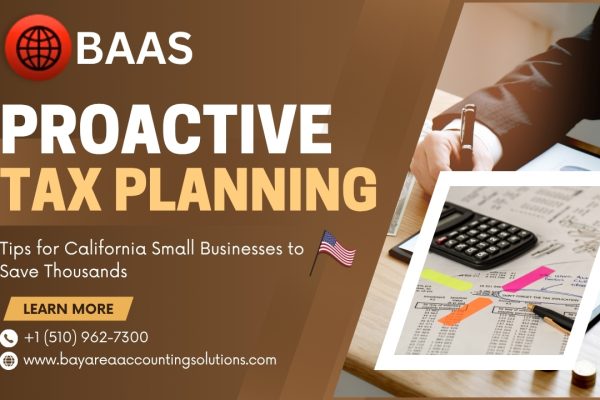Tax Season 2025: How Small Businesses Can Prepare Early and Save Big
Tax season can be stressful for small business owners in the Bay Area, but with early preparation, you can save time, reduce stress, and even lower your tax liability. Planning ahead ensures compliance with federal and California tax requirements while keeping your finances organized.
This guide provides practical tips for small businesses to prepare for Tax Season 2025 and maximize potential savings.
Why Early Tax Preparation Matters
Small business taxes can be complex. From payroll to estimated taxes, sales tax, and deductions, missing details can lead to:
- Penalties and interest from late filings
- Missed deductions that increase tax liability
- Cash flow challenges
Pro Tip: Treat tax season as a year-round process rather than a last-minute task. Staying organized throughout 2025 will make filing smoother and save money.
1. Organize Your Financial Records
Accurate records are the foundation of stress-free tax preparation. Essential documents include:
- Invoices and receipts
- Bank and credit card statements
- Payroll records
- 1099s from contractors and clients
- Sales tax reports
Pro Tip: Use cloud-based accounting software to keep all records centralized, secure, and easily accessible.
2. Review Your Business Structure
Your business structure (LLC, corporation, or sole proprietorship) affects how taxes are calculated. Early review ensures you’re taking advantage of all applicable tax benefits.
Pro Tip: Consult a CPA to determine if changing your structure could provide tax advantages for 2025.
3. Track Income and Expenses Regularly
Frequent tracking prevents errors and missed deductions. Keep an eye on:
- Business expenses, including home office costs, equipment, software, and subscriptions
- Revenue streams from all clients or platforms
- Travel and vehicle expenses used for business
Pro Tip: Categorize expenses monthly to simplify end-of-year reporting.
4. Maximize Deductions and Credits
Small businesses may qualify for several deductions and tax credits, such as:
- Section 179 deduction for business equipment
- Home office deduction
- Health insurance and retirement contributions
- Business-related travel and meals
Pro Tip: Work with an accountant to identify all eligible deductions and credits to reduce taxable income.
5. Estimate and Pay Quarterly Taxes
Many small businesses must pay estimated taxes quarterly to avoid penalties. Deadlines for 2025 include:
- April 15: First quarter
- June 15: Second quarter
- September 15: Third quarter
- January 15, 2026: Fourth quarter
Pro Tip: Setting aside funds monthly helps prevent cash flow surprises when payments are due.
6. Reconcile Accounts Regularly
Reconciliation ensures your books match bank and credit card statements. This process helps detect errors early, identify fraud, and keep records audit-ready.
Pro Tip: Schedule monthly reconciliations to maintain accurate financial statements year-round.
7. Plan for Tax Payments
Tax planning isn’t just about filing; it’s about anticipating payments and managing cash flow. Create a schedule for:
- Federal and state income taxes
- Payroll taxes
- Sales tax obligations
Pro Tip: Automate payments where possible to avoid missed deadlines.
8. Consider Professional Support
Small business owners often benefit from CPA or accounting services. Professionals can:
- Ensure accurate filings for IRS and California tax authorities
- Identify deductions and credits you may have missed
- Provide strategic advice for minimizing taxes and optimizing cash flow
Pro Tip: Choose a Bay Area accounting firm familiar with local regulations to maximize your tax savings.
Why Bay Area Accounting Solutions (BAAS) Can Help
At Bay Area Accounting Solutions, we specialize in helping small businesses across Fremont, Oakland, San Jose, and surrounding areas prepare for tax season efficiently. Our services include:
- Bookkeeping and financial reporting
- Quarterly and annual tax planning and filing
- Cash flow management
- Strategic tax-saving advice
Partnering with BAAS ensures your business is organized, compliant, and ready to save big in Tax Season 2025.
Conclusion
Preparing early for Tax Season 2025 gives small businesses a competitive advantage. By organizing records, tracking income and expenses, reconciling accounts, and leveraging professional expertise, you can save money, reduce stress, and maintain compliance.
Ready to make Tax Season 2025 your easiest yet? Partner with Bay Area Accounting Solutions today and maximize savings while focusing on growing your business.
FAQ — Small Business Tax Preparation
Q1: When are small business taxes due in 2025?
Quarterly estimated taxes are due April 15, June 15, September 15, and January 15, 2026. Annual returns depend on your business structure.
Q2: Can I deduct home office expenses?
Yes, if a portion of your home is used exclusively and regularly for business purposes.
Q3: Do I need a CPA for small business taxes?
While not mandatory, a CPA ensures accurate filings, identifies deductions, and helps with tax planning.
Q4: How can I avoid late payment penalties?
Track deadlines, reconcile accounts, and consider automated or professional-managed payments.
Q5: What is the best way to save on taxes legally?
Early planning, maximizing deductions, claiming credits, and working with a professional accountant are key strategies.




